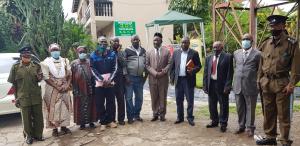WHO Supports the Ministry of Health to train Members of the Traditional Health Practitioners’ Association of Zambia on COVID -19
The World Health Organization Country Office has continued to provide support to the Ministry of Health and the Zambia National Public Health Institute (ZNPHI) to engage communities in the national response to COVID-19. Traditional healers in Zambia are consulted by people in communities for health problems such as Malaria, Tuberculosis, HIV and AIDS, mental health and many others. This places them at high risk of getting infected by COVID-19 and them also infecting others. It is for this reason that the Ministry of Health organized a training for members of the Traditional Health Practitioners’ Association of Zambia (THPAZ)to raise their knowledge and understanding on the disease and to promote prevention practices. The training which was conducted from 8-12 December 2020 also served as a platform to advocate for support in ensuring that community members continued to access essential health services during COVID-19 and beyond.
The workshop was officially opened by Professor Victor Mukonka from the Zambia National Public Health Institute. In his remarks, he stated that COVID-19 had affected a total of 96 out of the 115 districts in the country and emphasised the need for all stakeholders to work together to stop the disease spreading. He said that government recognised the important role that Traditional health practitioners played in providing health services in their communities. He urged the members of the association to take preventive measures as they conducted their work and emphasized the need for them to refer patients with COVID-19 symptoms to health facilities in order to save life.
The President of the Traditional Health Practitioners Association of Zambia (THPAZ), Dr. Rodwell Vongo thanked the Ministry of Health and the World Health Organisation for organising the orientation of members of the association on COVID 19 and other essential health services. He recognised the support government had provided to the association for programmes such as HIV and AIDS and appealed to government to strengthen the practice of traditional medicine using models existing in other countries. He said that with a total of 40,000 members across the country, the association was a sleeping giant that could improve the provision of health services at community level. Dr. Vongo also appealed for strengthening of research in traditional medicines and training of the members of the association.
The meeting brought together participants from all the 10 provinces of Zambia.




